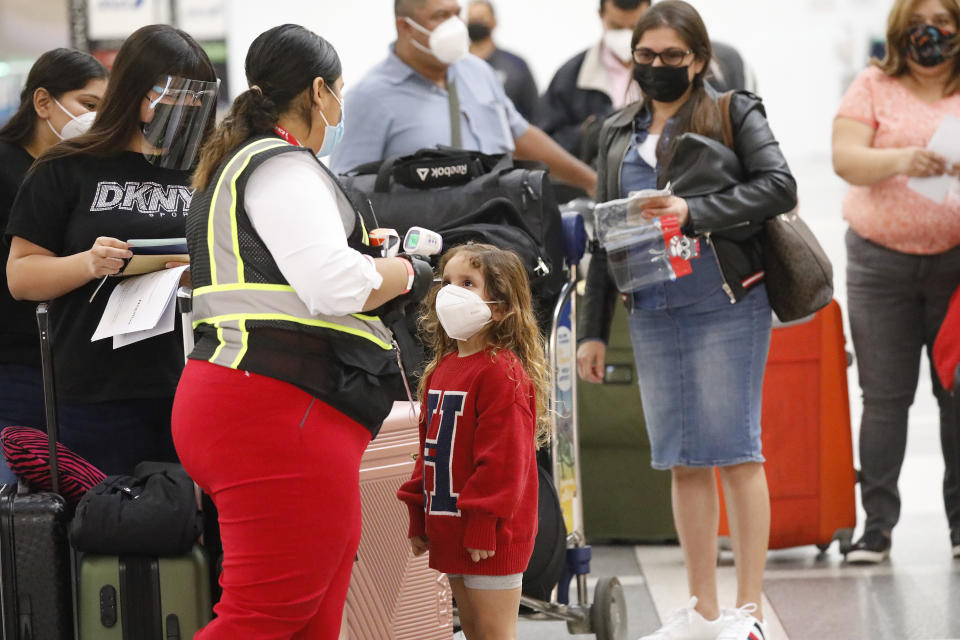The CDC says COVID-19 airport screenings are 'ineffective': How to stay safe when you fly
Just days after a large study found that temperature and symptom screenings are ineffective at detecting cases of COVID-19, there is another report that casts doubt on the popular practice. This time it’s focused on airport screenings.
The report, which was released by the Centers for Disease Control and Prevention (CDC), analyzed data from 766,044 travelers and found that screenings detected only nine positive cases of SARS-CoV-2, the virus that causes COVID-19. That amounts to just 0.001 percent of travelers.

“The low case detection rate of this resource-intensive program highlighted the need for fundamental change in the U.S. border health strategy,” the researchers wrote in the report. “Because SARS-CoV-2 infection and transmission can occur in the absence of symptoms and because the symptoms of COVID-19 are nonspecific, symptom-based screening programs are ineffective for case detection.”
The report comes less than a week after research on U.S. Marine recruits found that temperature and symptom screening failed to pick up several cases of COVID-19 within a closed campus.
In September, the CDC announced that the U.S. government would stop conducting health screenings on airline passengers who arrive in the country. “We now have a better understanding of COVID-19 transmission that indicates symptom-based screening has limited effectiveness because people with COVID-19 may have no symptoms or fever at the time of screening, or only mild symptoms,” the CDC said in a statement at the time.
Instead, the CDC said, it will be “shifting” strategy and “prioritizing other public health measures to reduce the risk of travel-related disease transmission.”
Now the CDC says in the new report that the organization is focused on “enhancing communication with travelers to promote recommended preventive measures, strengthening response capacity at ports of entry and encouraging pre-departure and post-arrival testing.”
The latest report “highlights the high numbers screened to get very few positive tests,” infectious disease expert Dr. David Cennimo, assistant professor of medicine at Rutgers New Jersey Medical School, tells Yahoo Life. He says it only “makes sense” that these screenings don’t detect many COVID-19 cases.
“We know that around half of infections are asymptomatic or so minimally symptomatic as to not trigger on a symptom screen,” Cennimo says. COVID-19 is also already rampant in the U.S., making screening incoming passengers even less effective at preventing the spread of the virus, he points out. “Traveler screenings are even less helpful because of our U.S.-based cases,” he says. “I am probably more likely to get COVID-19 staying in the U.S. for two weeks than I am traveling to China.”
That raises a huge question: How can you stay safe when you fly?
It’s important to point out that the CDC urges people to avoid travel, if possible, noting online that “staying home is the best way to protect yourself and others from COVID-19.” Dr. Richard Watkins, an infectious disease physician in Akron, Ohio, and a professor of medicine at the Northeast Ohio Medical University, also urges people to rethink their travel plans. “Travelers really need to reflect on whether their travel is absolutely necessary,” he says. “Flying, along with a lot of other things, is risky, and I would recommend against it.”
If you decide to fly anyway, the CDC recommends that you do the following:
Wear a mask over your nose and mouth.
Do your best to avoid close contact by staying at least six feet apart from anyone who is not from your household.
Wash your hands often or use hand sanitizer with at least 60 percent alcohol.
Try to avoid contact with anyone who is sick.
Try to avoid touching your eyes, nose and mouth.
Wearing a mask is crucial, Dr. Nicholas Kman, a physician at the Ohio State University Wexner Medical Center, tells Yahoo Life. “Mask compliance has to be 100 percent,” he says. “That includes the person next to you. If they’re taking their mask off to eat or drink, that will potentially put you at risk.”
Cennimo recommends keeping your mask on “at all times” and attempting to seat yourself apart from others as much as possible. Also, if you can, he recommends that you “avoid moving around” to lower your exposure to others.
If you have access to antibacterial wipes, Cennimo also suggests wiping down your seat and area. “That would certainly help,” he says.
It’s also not a bad idea to wear a face shield or protective goggles, Kman says. “In a hospital setting, we wear both a mask and eye protection,” he says. “Any type of eye protection would be certainly safer than not wearing eye protection.”
Overall, experts urge everyone to rethink their travel plans. “Do you really need to fly?” Kman says. He also urges people to think about what they will do after they arrive at their destination. “Are you going to travel to be at a Thanksgiving gathering with four or five other families? Because that’s not safe either,” Kman says.
For the latest coronavirus news and updates, follow along at https://news.yahoo.com/coronavirus. According to experts, people over 60 and those who are immunocompromised continue to be the most at risk. If you have questions, please reference the CDC’s and WHO’s resource guides.
How to maintain your physical and mental health during the pandemic
Taking care of a loved one with COVID-19? Here’s how to stay healthy
Q&A with Dr. Kavita Patel: How to keep your family safe and maintain your mental health
Read more from Yahoo Life
More than 1 million kids have been diagnosed with COVID-19. Why isn't it getting more attention?
Moderna vaccine suggests COVID-19 may be easily 'vaccinatable'
Want lifestyle and wellness news delivered to your inbox? Sign up here for Yahoo Life’s newsletter.

